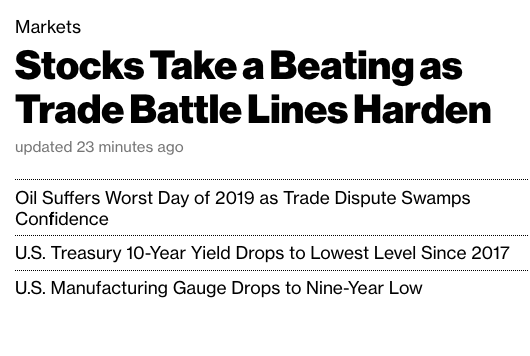The short time horizon president
[As usual, read my Econlog post if you only have time for one today.]
Today offers another example of a theme I’ve been pushing for several years. Trump is president with a short time horizon, eager to take actions that look good today at a cost to future generations. Examples include:
1. Ramping up moral hazard in the financial system.
2. Reckless “tax and spend” fiscal policy.
3. Moving away from the rule of law, toward authoritarianism.
4. Ignoring global warming.
5. Politicizing monetary policy
In each case, Trump has a lot of “capital” to spend, as the US has traditionally been a pretty well run country. As Adam Smith pointed out, there’s a great deal of ruin in a nation. Even with Trump’s reckless actions, we are unlikely to face a fiscal crisis, a banking crisis, a global warming crisis or a serious move toward authoritarianism in the next few years.
Today we see another example. Before explaining this situation, let me remind readers that Trump is one of those guys who frequently accuses others of having the very flaws that he himself has. Thus the recent claim that Biden is a low IQ person. Or that other candidates were “liars”.
Trump recently accused the Chinese of negotiating in bad faith on trade, backing off from promises that they had previously made. Of course there’s no way to know if any of this is true, as nothing said by Trump or his aides can be trusted. In any case, Trump has now done exactly what he accused the Chinese of doing—reneging on a trade deal with Mexico, which he agreed to just a few months ago.
The US has built up a lot of reputational capital in foreign affairs. We often make serious mistakes, such as the Vietnam and Iraq Wars, but there is always a certain logic to our actions. We are one of the “serious” countries, and have been one for most of our history. Trump has decided to spend some of the reputational capital for short-term political gain.
If we’d been a wild and crazy country for the past 100 years, there is no way the rest of the world would have trusted us to control their money (as we effectively do with our leverage in the global banking system.) Thus Trump has the ability to recklessly use powerful economics sanctions against other countries precisely because all previous American presidents have been so un-Trump like in their policies.
This is just one of the many reasons why Trump is by far the worst President in US history. He’s not just a bad American president, like Nixon or LBJ. He’s not really an American president at all. He’s a completely different animal—a sort of a Venezuelan or Filipino president living in the American White House.
Enjoy it while it lasts; your children will pay the price.
PS. The sad decline of Lindsey Graham
PPS. The pathetic abasement of Ronna Romney McDaniel


